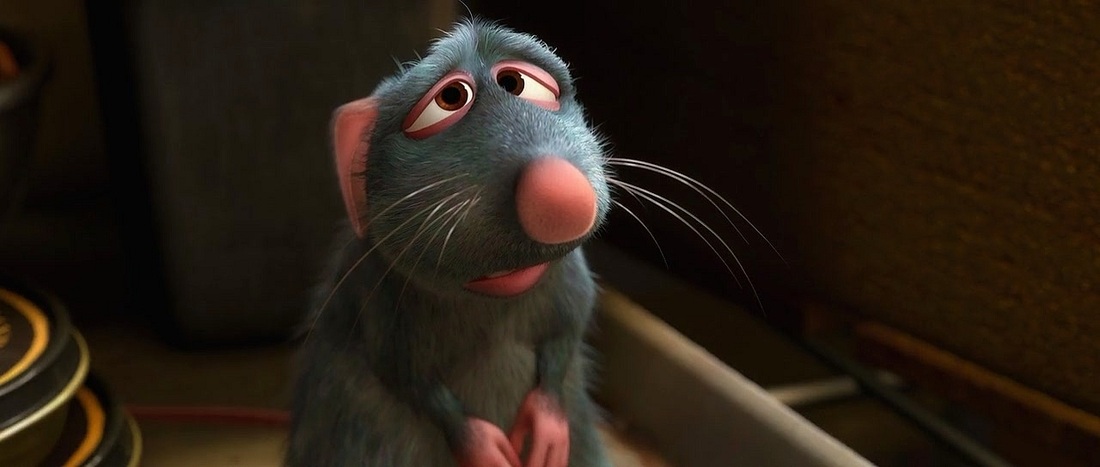| I can understand why this happens. Upon a cursory, casual viewing, Ratatouille can seem simple and underwhelming. Compared to monsters, sea creatures, and super heroes, rats are commonplace, and even a bit repulsive. We’ve all seen The Great Mouse Detective and The Rescuers Down Under. I’ll also grant that the movie’s most obvious conflict (Oh no! Remi’s been separated from his family!) has been done many times before, and arguably better. (Think Feivel Goes West). But beneath these impulsive critiques crawls a courageous film, packed with shrewd restraint, risky juxtaposition, and uncompromising craft. For starters, Ratatouille eschews easy gags for more mature comedic development. Instead of punch lines (“Squirrel!”) or whale sounds (Dory, Nemo), Ratatouille opts for nuanced character development and comic family dynamics. Like watching a childhood friend grow into an adulthood career, observing Remi as he selects ingredients for a soup becomes an immensely satisfying experience. We chuckle as he glares at a particular seasoning, then laugh at his overconfidence when he flubs a step in the recipe. Pixar carefully develops Remi’s talents (a superb nose, a creative culinary mind), and shortcomings (a touch of arrogance, a tendency to cut corners) at the outset of the film, a move that pays off many times over throughout the adventure. | My Top 10 Pixar Films 1. Ratatouille Good: Few less-than-stellar moments Bad: Few laugh-out-loud moments 2. Toy Story Good: Randy Newman’s opening song Bad: Randy Newman’s other songs 3. The Incredibles Good: Supremely entertaining Bad: Supremely long 4. Up Good: The opening montage Bad: The rest of the film 5. Toy Story 3 Good: Made me cry Bad: Didn’t make Megan cry 6. Monsters Inc. Good: The premise Bad: The final hour 7. Finding Nemo Good: The ocean Bad: The turtles 8. WALL-E Good: The animation Bad: The political agenda 9. Toy Story 2 Good: Stinky Pete the Prospector Bad: Jessie the Cowgirl 10. Brave Good: That red hair Bad: That plot |
Emile—Remi’s rotund, indecisive brother—and Django—his proud, by-the-book father—draw out even more of the young rat’s amusing circumstances. As he hands Emile various exotic fruits and cheeses, or chronicles day-to-day activities with his misunderstanding father, we smile at their bewildered, whiskered expressions. Remi may be an artist, but as is often the case, his own family is the last to understand.
More than its comic characterizations, however, Ratatouille stands a rat above the rest for its clever, crafted message. Early on, the film asserts that “anyone can cook,” no matter their upbringing, nationality, or (even) species. But crucially, the film also celebrates excellence. Just because anyone can cook doesn’t mean anything that gets cooked will be good. The movie gleefully condemns all sorts of bad food, from botched appetizers to frozen burritos to unoriginal, copycat entrees. In the cuddly world of animated kids’ movies, Ratatouille dares to champion a bit of healthy snobbery, even as it promotes creativity and ambition. It’s risky. It’s also unapologetically true to life.
Pixar’s other films creep a bit more carefully, producing polished versions of a parables we’ve already heard. There’s Toy Story’s celebration of loyalty, Nemo’s portrayal of familial resolve, The Incredibles’ presentation of bravery, Brave’s commemoration of Movies Where Half The Budget Is Spent On The Main Character’s Hair (See Fantasy, Final.) These are all fine films, and Pixar does familiar better than most do unique. Still, for a studio revolutionizing cinematic animation, these predictable plots expose a bit of uncharacteristic cautiousness. With Ratatouille, Pixar matches its artistic genius with equally novel narrative substance. Now that’s something worth mentioning.


 RSS Feed
RSS Feed
